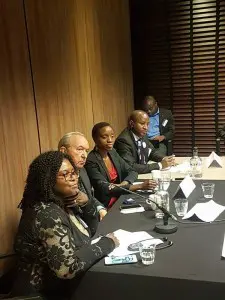
The 23rd Ordinary Summit of the African Union (AU) was held in Malabo, Equatorial Guinea last week. The Protocol on Amendments to the Protocol on the Statute of the African Court of Justice and Human Rights (which would be a merger of the African Court on Human and Peoples’ Rights and the African Court of Justice) was discussed and adopted at the Summit. Whilst the Protocol has several important and progressive clauses that could bode well for international criminal justice in Africa, it has one provision that is of serious concern: immunity for serving heads of state and senior government officials.
The issue of immunity for sitting heads of state gained notoriety after the International Criminal Court (the ICC) indictment of Sudanese President Omar Al Bashir, who is wanted for genocide and war crimes committed in Darfur, and the indictments of Kenyan President Uhuru Kenyatta and Deputy President William Ruto. The AU vociferously condemned the ICC for indicting sitting heads of state, arguing that leaders should be allowed to carry out their responsibilities and govern their nations without interruption.
The Protocolproposes that all sitting heads of state and senior government officials, depending on their function, be immune from prosecution. There are several problems with this clause. Firstly, the definition of “senior government official” remains vague and ambiguous and could include almost anyone, “depending on their function”.
Secondly, immunity contradicts the Rome Statute of the ICC, which a number of AU members have signed and ratified. Article 27 (1) and (2) of the Rome Statute state that the Statute
“1)…shall apply equally to all persons without any distinction based on official capacity. In particular, official capacity as a Head of State or Government, a member of a Government or parliament, an elected representative or a government official shall in no case exempt a person from criminal responsibility under this Statute, nor shall it, in and of itself, constitute a ground for reduction of sentence.
2)Immunities or special procedural rules which may attach to the official capacity of a person, whether under national or international law, shall not bar the Court from exercising its jurisdiction over such a person.”
If the African Court shields leaders from prosecution it will create contradictory legal norms and this will make the administration of justice for international crimes even more difficult.
Thirdly, the commitment made by the AU in its Constitutive Act to “ promote peace, security and stability on the continent and to protect human and peoples’ rights” stands at odds with the proposed immunity for heads of state and senior government officials purely because this immunity will perpetuate impunity. The sensible words of the AU Panel of the Wise seem to have been forgotten. They stated that impunity must be understood, “as the manifestation of the absence of institutions that promote pluralism, participation, impartiality, accountability and fairness…”[1] An African Court with no jurisdiction over serving heads of state and senior officials will result in impunity.
Genocide, war crimes and crimes against humanity are usually perpetrated by the state and its senior government officials. The very suggestion that they should be immune to prosecution during their tenure by the proposed regional accountability mechanism is difficult to comprehend.
In many of the AU member states the sitting head of state is already immune from prosecution at a domestic level and the adoption of the Protocol may further limit the already limited options for securing accountability. The Protocol still needs the signature and ratification of 15 member states before it becomes operational but the fact that the AU has adopted it is already cause for concern.
[1] African Union Panel of the Wise, “Peace, Justice, and Reconciliation in Africa: Opportunities and Challenges in the Fight Against Impunity,” The African Union Series, New York: International Peace Institute, February 2013 available at http://reliefweb.int/sites/reliefweb.int/files/resources/ipi_e_pub_peacejusticeafrica.pdf.African Union Panel of the WiseThis entry was posted in International Criminal Justice. Bookmark the permalink.
ONE RESPONSE TO “THE AFRICAN UNION ENDORSES IMPUNITY”



